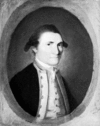James Cook
 From Conservapedia
From Conservapedia James Cook, (1728-1779), British navigator, was born on 27 October 1728, in Yorkshire, England. He died in the Sandwich Islands (now Hawaii) on 14 February 1779.
A farm boy, he attended a village school and worked for a grocer in a Yorkshire village until apprenticed to a Whitby coal-shipper. He showed aptitude for mathematics and navigation, spent two years at sea in the Baltic trade and was offered a command. Instead he joined the Royal Navy, rapidly drew attention for his abilities, and in 1759 was instrumental in the clandestine charting of the St. Lawrence River, which allowed the British access to Quebec and its subsequent capture.
He began surveys of the Nova Scotia and Newfoundland coasts which were to last for some years, and led to his first command. The publication of his Newfoundland surveys and his observation of a solar eclipse were noted by the Royal Society and the Admiralty and when an expedition was planned to observe a transit of Venus in Tahiti in 1769, Cook was given command. He was promoted to lieutenant (from master, i.e. given a commission) and made commander of the bark "Endeavour" (368 tons), a converted Whitby collier (a vessel he would have been very familiar with). The voyage had two aims: the observations on Tahiti and (covertly) a search for the so-called “Great South Land”. The 94 men aboard included a team of scientists led by Joseph Banks.
They reached Tahiti in April 1769, made their observations, collected specimens; and set off for New Zealand – discovered by the Dutchman, Abel Tasman 237 years before. They circumnavigated both islands and took formal possession, then continued westwards. They sighted what was to be named Point Hicks on the coast of “New Holland” (Australia), (just south of the Victoria/NSW border) on 19 April 1770. They sailed north, surveying the whole east coast; spending time at Botany Bay to scrape Endeavour's bottom, and at present Cooktown for repairs after running onto part of the Great Barrier Reef. From there they passed through Torres Strait (where on Possession Island on 22 August he took formal possession of the whole east coast of new Holland for the Crown) and made for Batavia (modern Djakarta), where they rested and made repairs before returning to England, arriving on 13 July 1771.
On his second voyage of discovery, (1772-5) Cook, promoted to commander, and with two vessels – his own Resolution and the Adventure under Tobias Furneaux – became possibly the first European to cross the Antarctic Circle when he circumnavigated Antarctica at high latitudes confirming that no “Great South Land” jutted up into any of the temperate oceans. The voyage is more important for what it didn't discover than finding anything new. New lands were found near the tip of South America, some sub-Antarctic islands were discovered and the Adventure, separated by fog and gales in the Southern Ocean, visited New Zealand, then poked around the southeast of Tasmania before exploring the east coast and discovering Flinders Is. at the western entrance to Bass Strait. (Tasmania, though, was still assumed to be connected to the Australian mainland.)
Cook's third voyage (1776–80)(now as a post-captain and member of the Royal Society) was part of a new effort to find the Northwest Passage; a navigable route between the Atlantic and Pacific oceans across the top of Canada. Whilst others tackled it from the east, Cook, again in the Resolution accompanied by HMS Discovery under Captain Charles Clerke, sailed via Cape of Good Hope, Tasmania and Tahiti for the north Pacific, becoming the European discoverer of Hawaii. He explored and charted the north Pacific coasts of North America and Siberia, attempting to push up into the Bering Sea, but failing because of ice. He returned to Hawaii for rest and repairs but got into a fight with the local Hawaiians, and at Kealakekua Bay on 14 February 1779 was killed by them.
Cook was the consummate “discoverer” in that he was an explorer, navigator, surveyor, cartographer, scientist and leader of men. He was the first to realise the importance of hygiene and diet on board, and whilst his men would grumble at this, it kept them alive on the tiny vessels they were on for months. ("Endeavour" was less than half again as long as Columbus’ "Santa Maria"). His three great voyages to the South Seas were predominately for scientific reasons and the pursuit of knowledge and his discoveries were shared with the world; even if they enabled Britain to replace the loss of one empire with another.
References:
- Australian Dictionary of Biography – Online Edition.
- “Voyages Around the World by James Cook” ed. D. Laing Purves. (1878)
The James Cook University in North Queensland, Australia and the James cook University Hospital in Middlesbrough, United Kingdom were named in his honor.[1]
References[edit]
| |||||
Categories: [British Empire] [Anglicans]
↧ Download as ZWI file | Last modified: 03/11/2023 01:37:44 | 12 views
☰ Source: https://www.conservapedia.com/James_Cook | License: CC BY-SA 3.0
 ZWI signed:
ZWI signed:
 KSF
KSF